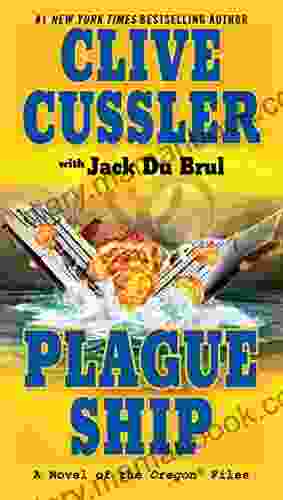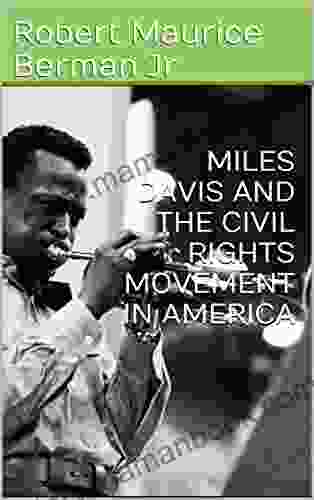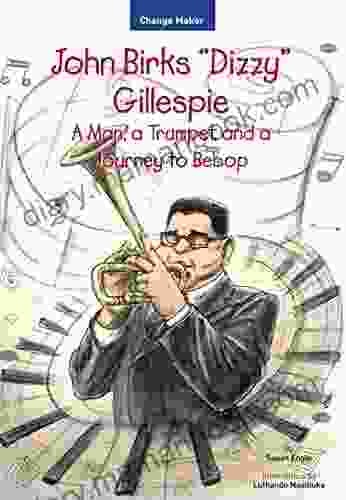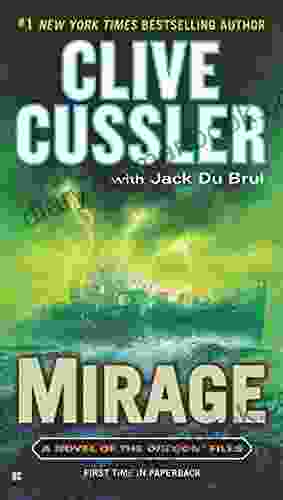Man With Trumpet: The Journey to Bebop and Beyond

Dizzy Gillespie was a trumpet player, bandleader, and composer who was one of the most important figures in the development of bebop. Bebop was a new style of jazz that emerged in the 1940s, characterized by its fast tempos, complex harmonies, and improvisational solos.
5 out of 5
| Language | : | English |
| File size | : | 14642 KB |
| Text-to-Speech | : | Enabled |
| Screen Reader | : | Supported |
| Enhanced typesetting | : | Enabled |
| Word Wise | : | Enabled |
| Print length | : | 144 pages |
Gillespie was born in Cheraw, South Carolina, in 1917. He began playing the trumpet at an early age, and by the time he was a teenager, he was playing professionally. In the early 1940s, Gillespie moved to New York City, where he quickly became involved in the bebop scene.
Gillespie was a brilliant improviser, and his solos were often filled with complex melodic lines and harmonic surprises. He was also a gifted bandleader, and his groups were known for their innovative sound. In the 1950s, Gillespie began to experiment with Afro-Cuban rhythms, and his music became even more complex and exciting.
Gillespie continued to perform and record throughout his life, and he remained an important figure in jazz until his death in 1993. He was a true innovator, and his music helped to change the course of jazz history.
Early Life and Career
John Birks Gillespie was born on October 21, 1917, in Cheraw, South Carolina. His father was a Baptist minister, and his mother was a schoolteacher. Gillespie began playing the trumpet at an early age, and by the time he was a teenager, he was playing professionally. In the early 1940s, Gillespie moved to New York City, where he quickly became involved in the bebop scene.
Gillespie's early influences included Louis Armstrong, Roy Eldridge, and Charlie Parker. He developed his own unique style of playing, which was characterized by its fast tempos, complex harmonies, and improvisational solos. Gillespie was also a gifted bandleader, and his groups were known for their innovative sound.
The Bebop Revolution
Bebop emerged in the 1940s as a new style of jazz that was characterized by its fast tempos, complex harmonies, and improvisational solos. Gillespie was one of the most important figures in the development of bebop, and his music helped to define the sound of the new style.
Bebop was a radical departure from the swing music that had been popular in the 1930s. Swing music was characterized by its danceable rhythms and simple melodies. Bebop, on the other hand, was more complex and challenging, and it was not as easy to dance to. However, bebop quickly gained a following among jazz fans, and it soon became the dominant style of jazz in the 1940s.
Gillespie's Innovations
Gillespie was a brilliant improviser, and his solos were often filled with complex melodic lines and harmonic surprises. He was also a gifted bandleader, and his groups were known for their innovative sound. Gillespie was always experimenting with new musical ideas, and he was not afraid to push the boundaries of jazz.
One of Gillespie's most important innovations was his use of Afro-Cuban rhythms. In the 1950s, Gillespie began to experiment with Afro-Cuban rhythms, and his music became even more complex and exciting. Gillespie's use of Afro-Cuban rhythms helped to create a new sound in jazz, and it influenced the development of Latin jazz.
Later Career
Gillespie continued to perform and record throughout his life, and he remained an important figure in jazz until his death in 1993. He was a true innovator, and his music helped to change the course of jazz history. Gillespie was awarded the Grammy Lifetime Achievement Award in 1989.
Legacy
Dizzy Gillespie was one of the most important figures in the development of jazz. His music helped to define the sound of bebop, and he was a pioneer in the use of Afro-Cuban rhythms. Gillespie was a brilliant improviser, a gifted bandleader, and a true innovator. His music continues to inspire jazz musicians and fans around the world.
Dizzy Gillespie was a true giant of jazz. His music was innovative, exciting, and challenging, and it helped to change the course of jazz history. Gillespie was a brilliant improviser, a gifted bandleader, and a true innovator. His music continues to inspire jazz musicians and fans around the world.
References
- Gillespie, Dizzy. To Be or Not to Bop. Da Capo Press, 1979.
- Gitler, Ira. The Masters of Bebop. Da Capo Press, 1985.
- Schuller, Gunther. The Swing Era: The Development of Jazz, 1930-1945. Oxford University Press, 1989.
5 out of 5
| Language | : | English |
| File size | : | 14642 KB |
| Text-to-Speech | : | Enabled |
| Screen Reader | : | Supported |
| Enhanced typesetting | : | Enabled |
| Word Wise | : | Enabled |
| Print length | : | 144 pages |
Do you want to contribute by writing guest posts on this blog?
Please contact us and send us a resume of previous articles that you have written.
 Top Book
Top Book Novel
Novel Fiction
Fiction Nonfiction
Nonfiction Literature
Literature Paperback
Paperback Hardcover
Hardcover E-book
E-book Audiobook
Audiobook Bestseller
Bestseller Classic
Classic Mystery
Mystery Thriller
Thriller Romance
Romance Fantasy
Fantasy Science Fiction
Science Fiction Biography
Biography Memoir
Memoir Autobiography
Autobiography Poetry
Poetry Drama
Drama Historical Fiction
Historical Fiction Self-help
Self-help Young Adult
Young Adult Childrens Books
Childrens Books Graphic Novel
Graphic Novel Anthology
Anthology Series
Series Encyclopedia
Encyclopedia Reference
Reference Guidebook
Guidebook Textbook
Textbook Workbook
Workbook Journal
Journal Diary
Diary Manuscript
Manuscript Folio
Folio Pulp Fiction
Pulp Fiction Short Stories
Short Stories Fairy Tales
Fairy Tales Fables
Fables Mythology
Mythology Philosophy
Philosophy Religion
Religion Spirituality
Spirituality Essays
Essays Critique
Critique Commentary
Commentary Glossary
Glossary Bibliography
Bibliography Index
Index Table of Contents
Table of Contents Preface
Preface Introduction
Introduction Foreword
Foreword Afterword
Afterword Appendices
Appendices Annotations
Annotations Footnotes
Footnotes Epilogue
Epilogue Prologue
Prologue Sophie Kerr
Sophie Kerr Jeff Garrett
Jeff Garrett Richard Beard
Richard Beard Josie Brown
Josie Brown Jon Clinch
Jon Clinch Empress Simone
Empress Simone Mark Batterson
Mark Batterson Julie Ryan Mcgue
Julie Ryan Mcgue Peter Corfield
Peter Corfield Sue Dockett
Sue Dockett Marianne Moore
Marianne Moore Arlene Pellicane
Arlene Pellicane Mari Ono
Mari Ono Phyllis Hunter
Phyllis Hunter Colleen Francis
Colleen Francis Colleen Hoover
Colleen Hoover Rich Murphy
Rich Murphy Alecky Blythe
Alecky Blythe Andrew Alexander
Andrew Alexander Debtors Anonymous
Debtors Anonymous
Light bulbAdvertise smarter! Our strategic ad space ensures maximum exposure. Reserve your spot today!
 John GrishamFollow ·15.3k
John GrishamFollow ·15.3k Herman MitchellFollow ·3.5k
Herman MitchellFollow ·3.5k Nathan ReedFollow ·2k
Nathan ReedFollow ·2k William GoldingFollow ·4.6k
William GoldingFollow ·4.6k Stuart BlairFollow ·3.8k
Stuart BlairFollow ·3.8k Jarrett BlairFollow ·4.6k
Jarrett BlairFollow ·4.6k Reed MitchellFollow ·4.1k
Reed MitchellFollow ·4.1k Sidney CoxFollow ·14.9k
Sidney CoxFollow ·14.9k

 Jorge Luis Borges
Jorge Luis BorgesThe Truth About the 15 Qualities That Men Secretly Admire...
Every woman wants to be loved and...

 Francisco Cox
Francisco CoxPlague Ship: Unraveling the Mystery of the Oregon Files
The Oregon Files, a collection of classified...

 Rudyard Kipling
Rudyard Kipling101 Strategies to Make Academic Vocabulary Stick: A...
Academic vocabulary is an...

 Fletcher Mitchell
Fletcher MitchellPractitioner Guide for Cities, Regions, and Countries:...
The world is...

 Emilio Cox
Emilio CoxOptimization and Security Challenges in Smart Power Grids
Smart power grids (SPGs) are emerging as a...

 Chandler Ward
Chandler WardMiles Davis and the Civil Rights Movement in America: A...
Miles Davis, the iconic jazz...
5 out of 5
| Language | : | English |
| File size | : | 14642 KB |
| Text-to-Speech | : | Enabled |
| Screen Reader | : | Supported |
| Enhanced typesetting | : | Enabled |
| Word Wise | : | Enabled |
| Print length | : | 144 pages |












